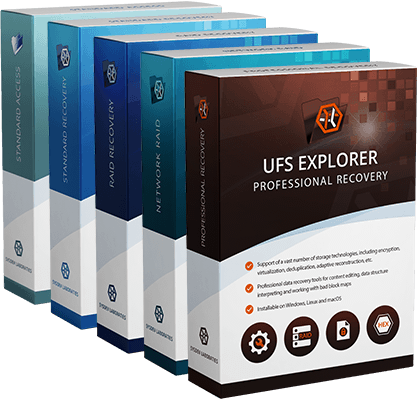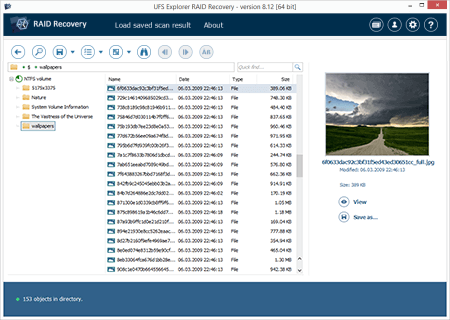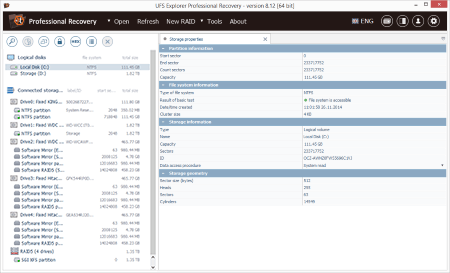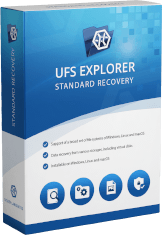
UFS Explorer
is a versatile software solution designed to respond to the elevated requirements of specialists in data recovery. A set of efficient basic instruments makes it invaluable in tackling simple everyday data loss and access issues whereas unique advanced features increase the scope of its implementation to the most complicated and non-trivial tasks.
A comprehensive toolkit for power users
In view of its extensive functionality, the software will come in handy to recover data in cases of any complexity: from simple file deletion to work with failing or corrupted storage media.

The software is perfectly fit for a very many of typical data recovery cases, like retrieval of deleted files or reconstruction of corrupted file systems on various internal and external storage devices. The sophisticated scanning algorithms enable it to locate every single piece of recoverable information with minimum references to the device and in the shortest possible time. The convenient adjustable interface offers a wide range of auxiliary tools and options to make every operation easy and smooth while the read-only mode ensures the complete safety of the procedure.

UFS Explorer allows specialists to work with various uncommon file systems, including Windows ReFS, Linux Btrfs and Unix ZFS, particular storage technologies, like Apple Core Storage, Linux LVM with thin provisioning, Storage Spaces and deduplication of Microsoft, digital media protected by BitLocker, LUKS (1, 2), TrueCrypt, VeraCrypt, FileVault 2 or APFS encryption, drives with non-standard sector sizes, many formats of virtual disks and a whole range of RAID configurations, including custom and specific ones, like ZFS RAID-Z, Drobo BeyondRAID, Synology Hybrid RAID and Btrfs-RAID.
UFS Explorer offers an advanced disk reading mechanism with the opportunity to specify parameters like I/O timeout and an option to read out the storage only once, reducing disk wear to the very minimum. An embedded tool for creating disk images makes the procedure fully customizable and allows configuring read timeout, block size as well as rules for skipping bad blocks after an unsuccessful attempt to read the storage. Also, the program allows creating a map of bad blocks to omit areas with defects, monitoring S.M.A.R.T., errors, etc. Easy manipulations with raw data are also possible thanks to a variety of data analysis and editing tools.
UFS Explorer makes it possible to obtain access to data or recover files over a Local Area Network, when storage devices are connected to another remote PC or even several computers running different operating systems. A RAID configuration can also be assembled from components that are physically attached to different machines: the program will give the host computer access to the remote PCs and allow using their disks as members of the array. Defective drives connected to DeepSpar Disk Imager can be operated by UFS Explorer via LAN as well, with an adjustable read timeout, block size and other settings.
Choose a variant ideal for your needs
The software is represented by six different editions each equipped with an individual combination of functions and features.

The program provides immediate access to the available content and allows restoring lost information from a wide set of file systems employed in Windows, Linux and macOS.
The application detects such volumes as Apple Software RAID, Linux LVM and mdadm, Windows Dynamic disks, etc. and assembles them for further operations.
The software offers convenient means for the search of missing partitions by file system metadata or within a specified region on the storage.
The process of data recovery is accompanied by helpful instructions and explanations integrated into the interface of the application.

The software is able to handle electronic devices of any complexity, from a simple thumb drive to a multi-disk RAID-based NAS.
The program offers both automatic and manual reconstruction of RAID, providing the possibility to process various configurations: standard, nested and custom user-defined sets.
The raw content and layout of an assembled disk array can be visualized to simplify the verification of its consistency and accuracy of the chosen RAID level, order of drives or other parameters.
RAID units that are composed of disks with bad blocks can be processed using bad sectors maps generated dynamically or by compatible software.

The utility allows working with various storage devices that are attached to another computer or even multiple machines under different operating systems.
The program enables the assembly of RAID from disks that are connected to different computers, provided that the machines belong to the same Local Area Network.
The software is compatible with DeepSpar Disk Imager device, works with the disks connected to it using LAN and supports disk images produced by this very solution.
The application supports numerous RAID configurations, including standard, nested and custom RAID patterns, while data and scheme visualization allow checking the accuracy of the setup.

Along with numerous file systems, the software handles various specific storage technologies, RAID configurations, virtual machines, drives with non-standard sector sizes, etc.
The program is capable of decrypting disk volumes protected with BitLocker, LUKS, TrueCrypt, VeraCrypt, FileVault 2 and APFS encryption without their prior deciphering in the operating system.
The software offers a full range of advanced possibilities when it comes to the extraction of data from defective devices, including “read-once” storage access and defects emulation.
The application creates interactive reports with a complete representation of the recovered file system as well as various reports as to defective files, software events, etc.

The software supports numerous non-Windows formats, providing the possibility to access the needed files and copy them to a compatible storage without booting into another OS.
The program handles most types of digital media, making it possible to easily share files between Windows and other non-compatible systems without formatting the storage.
The application allows opening and copying out the content of a virtual disk without the need to run or configure the corresponding virtual machine.
The software offers several auxiliary modules for RAID assembly, creating a span from disk image files, import of Runtime VIM files and defining “read once” storages.
Frequently asked questions
-
UFS Explorer Standard Recovery
Version 10.12.1 Click to learn about the update -
UFS Explorer RAID Recovery
Version 10.12.1 Click to learn about the update -
UFS Explorer Network RAID
Version 10.12.1 Click to learn about the update -
UFS Explorer Professional Recovery
Version 10.12.1 Click to learn about the update -
UFS Explorer Standard Access
Version 5.32 Click to learn about the update